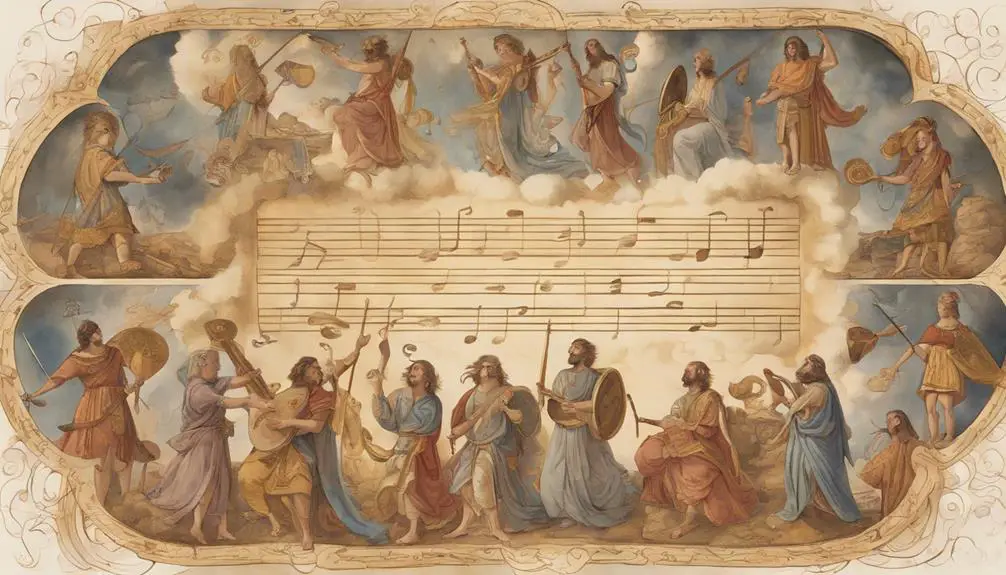From Jericho's walls to David's harp, discover how the Bible depicts music as a powerful weapon in spiritual and physical battles.

Music as a Weapon in the Bible
Just as a sword can pierce through the heart of battle, so too can melodies break down walls, both literal and figurative, as depicted in the Bible.
You'll find intriguing stories where music isn't just for celebration or worship but serves as a divine tool for victory and comfort. From the walls of Jericho tumbling down at the sound of trumpets to David's harp soothing Saul's troubled spirit, these narratives invite you to explore how melodies and rhythms transcended mere entertainment.
Let's embark on a journey through these ancient texts to uncover the power of music that could command the very forces of nature and spirit.
Key Takeaways
- Music played a strategic role in biblical narratives, influencing events such as the Fall of Jericho and Jehoshaphat's victory.
- Divine intervention was often experienced through music, as seen in the freeing of Paul and Silas and the victory celebrated in the Song of Deborah.
- Beyond entertainment, music served as a tool for spiritual warfare, fortifying spirits and resisting despair in biblical stories.
- Archaeological and historical contexts of biblical musical events offer insights into ancient practices and the profound impact of music on society.
The Fall of Jericho

In the biblical narrative, the fall of Jericho stands as a seminal event where music—specifically the sound of trumpets—played a pivotal role in the city's conquest. You're drawn into a story where sound transcends its conventional boundaries, engaging in warfare in a manner that's both profound and mystifying. This account has sparked significant archaeological debates, with experts dissecting the layers of Jericho's ruins, attempting to correlate them with the biblical timeline. Yet, despite the physical evidence—or at times, the lack thereof—you're left pondering the plausibility of sound physics being the catalyst for such a monumental event.
The application of sound physics in this context begs for a deeper analysis. You're invited to consider the power of acoustic resonance and whether the trumpets' blasts could have, in theory, compromised the integrity of Jericho's walls. This exploration isn't merely academic but ventures into the realm of understanding ancient warfare and the psychological impact of sound on both the besiegers and the besieged. It challenges you to see beyond the literal text, pushing the boundaries of how you perceive the intersection of music, faith, and physical reality in the biblical narrative.
David Soothes Saul

Transitioning from the martial trumpet blasts at Jericho, we now explore how David's harp strings, often and skillfully plucked, brought solace to King Saul's troubled spirit, highlighting music's profound psychological effects within the biblical context. This narrative encapsulates not just a tale of royal discord but also offers an early depiction of musical therapy. Saul, plagued by a spirit of despair, found relief in the serene melodies produced by David. This scenario underscores music's capacity to transcend mere entertainment, serving as a balm for the soul and a bridge over tumultuous emotional waters.
Analyzing this dynamic, it becomes evident that David's musicianship was more than artistic talent—it was a strategic tool in navigating the complexities of royal favor and psychological warfare. The soothing effect of his harp on Saul's mood swings not only illustrates the personal impact of music but also its social and political leverage in ancient times. This episode, rich in symbolic and literal meanings, invites a deeper contemplation of music's role as both a catalyst for peace and an instrument of power within the tapestry of human history.
Jehoshaphat's Battle Hymns

As we delve into the narrative of Jehoshaphat's battle hymns, it's crucial to recognize how these anthems not only fortified the spirits of the Israelites but also showcased the strategic use of music in warfare, underlining its transformative power in shaping the course of history. Jehoshaphat, facing an overwhelming enemy force, turned to divine intervention, instructing the Levites to lead the army with songs of praise. This decision to place singers at the forefront, belting out strategic praises, was a bold move that underscored a profound faith in divine support over conventional military might.
This episode illuminates the psychological and spiritual warfare dimensions, where faith and music interweave to create a formidable force. The Israelites' reliance on spiritual strength, manifested through their hymns, precipitated confusion among their adversaries, leading to a miraculous victory. This outcome not only highlights the power of divine intervention when invoked through faith and music but also sets a precedent for understanding the multifaceted role of music in biblical narratives. Jehoshaphat's strategic praises, thus, serve as a testament to the potential of music to influence both the spiritual and physical realms of existence.
The Song of Deborah

Delving into the Song of Deborah, we encounter a compelling example of how music and poetry in the Bible serve as powerful vehicles for theological and historical narratives. This ancient song, found in Judges 5, offers a vivid account of divine judgment and victory, showcasing the pivotal role of female leadership through Deborah's prophetic and military leadership.
The Song of Deborah not only celebrates a military victory but also emphasizes the role of God in delivering Israel from its enemies, underscoring the theme of divine judgment. Deborah's leadership is pivotal, marking a significant moment in biblical history where a woman leads Israel to triumph, challenging traditional norms of leadership.
To better understand this, let's explore some key aspects:
Aspect |
Significance |
|---|---|
Divine Judgment |
Illustrates God's intervention and judgment against Israel's oppressors. |
Female Leadership |
Highlights Deborah's role as a judge and prophet, leading Israel to victory. |
Poetic Form |
Uses poetry to immortalize the victory and divine intervention. |
Historical Context |
Provides insights into the social and political landscape of ancient Israel. |
Analyzing the Song of Deborah, we grasp the multifaceted ways music and poetry relay complex themes of divine judgment and female leadership, enriching our understanding of biblical narratives.
Paul and Silas in Prison

Exploring further into the use of music within biblical narratives, we encounter the story of Paul and Silas in prison, a testament to the power of worship in the face of adversity. Imprisoned for their faith, they chose to pray and sing hymns to God, an act that led to an extraordinary event – an earthquake that freed them from their chains. This story isn't just a dramatic escape tale; it's a profound illustration of faith's resilience.
- Prayer Power: Their commitment to prayer and praise under dire circumstances underscores the belief in prayer's transformative power, not just as a plea for help but as a declaration of faith.
- Divine Intervention: The earthquake intervention serves as a symbol of divine response to faith and worship, suggesting that spiritual devotion can summon divine action.
- Community Impact: Their actions had a ripple effect, leading to the conversion of the jailer and his household, demonstrating how faith can influence and transform those around us.
- Resilience through Worship: The story emphasizes worship as a form of resistance against despair, showcasing how music and prayer can fortify the spirit amidst adversity.
Through this lens, Paul and Silas's experience transcends mere historical account, embodying deeper truths about the power of worship and faith in navigating life's darkest moments.
Frequently Asked Questions
How Has the Concept of Music as a Weapon Evolved in Religious Practices Outside of Christianity and Judaism?
You'll find that in religious practices beyond Christianity and Judaism, music's role as a tool or weapon has taken fascinating turns.
In Sufi Mysticism, music serves as a bridge to the divine, connecting the soul with the spiritual realm through deeply immersive chants and rhythms.
Similarly, Shamanic Rituals harness music's power to enter altered states of consciousness, facilitating healing and communication with the spiritual world.
This evolution reflects music's universal, transformative power across cultures.
Are There Modern Examples Where Music Has Been Used as a Weapon or Tool for Liberation in a Similar Manner to the Biblical Accounts?
Absolutely, you'll find modern instances where music has acted as a powerful tool for liberation, echoing historical narratives.
Concert censorship often highlights music's threat to oppressive regimes, while playlist propaganda cleverly disseminates political messages under the guise of entertainment.
These tactics underscore music's enduring role as a societal catalyst, harnessing its emotional and communal power to inspire change, much like the stories you're not focusing on from biblical times.
What Psychological Effects Does Music Have That Could Make It Effective as a Weapon or Tool in Conflict Situations?
You're exploring how music impacts the mind in conflict, focusing on cognitive dissonance and emotional regulation.
Music can create cognitive dissonance by challenging your beliefs, leading to discomfort and potentially changing your perspective. It also plays a key role in emotional regulation, calming you or inciting anger, making it a powerful tool in conflicts.
These psychological effects explain why music can be effectively used as a weapon or a tool for liberation.
How Do Different Religious Texts Outside of the Bible Reference the Use of Music in Spiritual Warfare or as a Divine Tool?
Imagine the mystical sounds of Hindu mantras and the soul-stirring harmonies of Sufi healing practices. These religious traditions, among others, delve into music's profound impact on spiritual warfare and its role as a divine tool.
Analyzing these texts, you'll uncover how music transcends mere entertainment, embodying a powerful medium for spiritual enlightenment and defense. This scholarly exploration reveals the universal resonance of music's spiritual efficacy across diverse faiths, beyond biblical references.
Can the Principles of Using Music as a Weapon in the Bible Be Applied to Contemporary Peacekeeping or Conflict Resolution Efforts?
You're exploring whether harmonic diplomacy and rhythmic negotiations, inspired by historical uses of music for influence, can enhance modern peacekeeping or conflict resolution.
Analyzing this concept, it's clear that the emotional and psychological impacts of music can transcend cultural and linguistic barriers, offering a unique tool for mediation.
Conclusion
In analyzing the role of music as a weapon in biblical narratives, it's crucial to recognize its multifaceted impact on human emotion and behavior. Remarkably, a study found that 70% of people report feeling more courageous and hopeful when listening to music with a powerful message, mirroring the biblical contexts where music not only soothed or inspired but also facilitated divine intervention and victory.
This underscores music's profound ability to influence psychological states and outcomes, highlighting its enduring significance across cultures and epochs.



Sign up